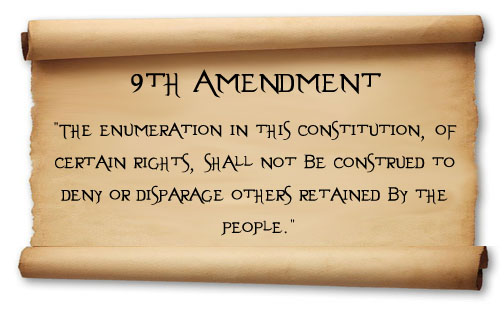When you read the ninth and tenth amendments, at first blush the ninth seems to be irrelevant because the same point appears to be repeated in the ending of the tenth. However, upon closer examination, the ninth is as important, if not more so, than the tenth.
These two amendments read, in order:
“The enumeration in the Constitution, of certain rights, shall not be construed to deny or disparage others retained by the people.”
“The powers not delegated to the United States by the Constitution, nor prohibited by it to the States, are reserved to the States respectively, or to the people.’
To understand why the ninth was inserted we need to return to the debate over whether or not a bill of rights was necessary. Alexander Hamilton argued against the wisdom of having a bill of rights in Federalist 84:
“It has been several times truly remarked that bills of rights are, in their origin, stipulations between kings and their subjects, abridgements of prerogative in favor of privilege, reservations of rights not surrendered to the prince. Such was MAGNA CHARTA, obtained by the barons, sword in hand, from King John. Such were the subsequent confirmations of that charter by succeeding princes. Such was the Petition of Right assented to by Charles I., in the beginning of his reign. Such, also, was the Declaration of Right presented by the Lords and Commons to the Prince of Orange in 1688, and afterwards thrown into the form of an act of parliament called the Bill of Rights. It is evident, therefore, that, according to their primitive signification, they have no application to constitutions professedly founded upon the power of the people, and executed by their immediate representatives and servants. Here, in strictness, the people surrender nothing; and as they retain every thing they have no need of particular reservations.”
As you can see, Hamilton’s argument is one of exclusion or silence. To state that the government cannot do something implies that without that prohibition it would be authorized or empowered to do so. But, if there is no prohibition stated, it is understood that no authority or power in that area exists to begin with. However, the Anti-Federalists opposed the ratification of the Constitution unless there was a guarantee that a bill of rights would be added to the newly minted constitution upon the convening of the first congress, and so in that first congress James Madison pressed the Federalists who controlled it to follow through on that guarantee and send to the states for ratification what we now know as our Bill of Rights.
This brings us to the language of the amendment in question. The ninth amendment addresses “rights”, whereas the tenth deals with the delegation of “powers” – two very different concepts. The purpose of the ninth amendment is to shore up what Hamilton warned of in his Federalist essay, namely that just because not every right was specifically enumerated within the Constitution, it did not mean that the people had forfeited them to the control of the central government. It is a “catch-all” amendment prohibiting the general government from assuming control over rights which the people had never intended to delegate to it.
Since the ninth amendment addresses “rights” over which no man or entity has the leeway to usurp, it is even more critical than the tenth. We hear much trumpeting of the tenth amendment today, and rightfully so, but it is imperative that we also understand the even greater significance of the ninth and that we, the people, reassert our claim to it in the face of a government which violates it at every turn.
-February 5, 2016
